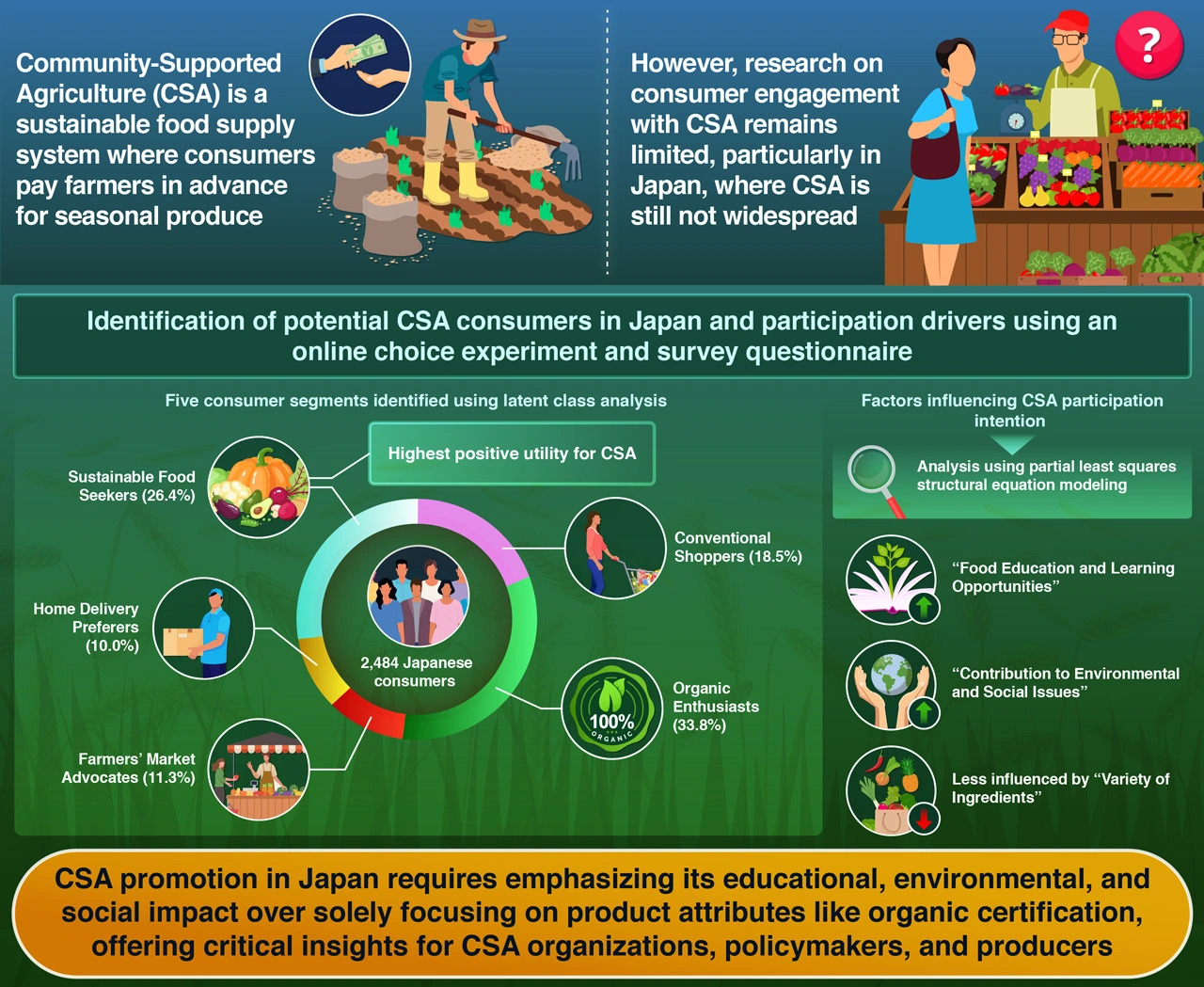Understanding Consumer Dynamics in Community-Supported Agriculture in Japan
Scientists identify potential consumer segments whose intentions to join Community-Supported Agriculture were driven by factors unique to Japan
Japan has five potential consumer segments for Community-Supported Agriculture (CSA), with “Sustainable Food Seekers” showing the highest interest—as shown by scientists from Institute of Science Tokyo (Science Tokyo). Unlike other countries, “Food Education and Learning Opportunities” and “Contribution to Environmental and Social Issues” majorly influenced Japanese consumers’ intentions to participate in CSA. These findings could help CSA organizations, policymakers, and producers develop tailored strategies to promote CSA participation in Japan.
Understanding Consumer Profiles and Participation in Community-Supported Agriculture in Japan

A Choice Experiment and Partial Least Squares Structural Equation Modelling Approach
Takagi et al. (2025) | International Journal of Gastronomy and Food Science | 10.1016/j.ijgfs.2025.101129
Conventional food production and distribution systems degrade the environment due to several aspects, like overuse of fertilizers and high greenhouse gas emissions. This necessitates a shift towards low environmental impact, sustainable food systems like Community-Supported Agriculture (CSA). In CSA, consumers pay producers in advance for their harvest. In this way, farmers get financial stability, and consumers get a chance to engage in farming activities, which ultimately strengthens local food systems.
Despite its benefits, there are few studies on what makes consumers participate in CSA, particularly outside Western countries. Specifically, in Japan, where CSA is not widely practiced, there is a limited understanding of how cultural differences influence consumer participation behaviors.
To gain more insights, a research team led by Mr. Sota Takagi, a graduate student from Institute of Science Tokyo (Science Tokyo), Japan, profiled potential consumers of CSA in Japan and analyzed the factors influencing their intentions to participate in CSA by using the CSA participation model. The team included Professor Miki Saijo from Science Tokyo and Associate Professor Takumi Ohashi from Science Tokyo and Chulalongkorn University. Their study was made available online on February 13, 2025 and will be published in Volume 40 of the International Journal of Gastronomy and Food Science in June 2025.
Takagi explains, “Only a few studies have quantified how sociocultural and psychological factors impact participation intentions, particularly in Japan. Moreover, research on consumer heterogeneity in CSA adoption remains underexplored. This hinders the development of effective engagement strategies.”
To this end, researchers conducted an online survey with 2,484 Japanese consumers. The survey included a choice experiment that assessed consumers’ preferences for locally grown vegetables based on attributes like organic certification, basket purchase, and willingness to pay for them. The survey also included questions related to the CSA participation model, awareness, and participation intention.
According to the CSA participation model, consumers assess the gains and losses associated with CSA and then decide to participate. This decision-making process is also influenced by their sociocultural environment.
Researchers performed statistical analysis on the choice experiment datasets and identified five consumer segments, namely: “Conventional Shoppers,” “Organic Enthusiasts,” “Farmers’ Market Advocates,” “Home Delivery Preferers,” and “Sustainable Food Seekers.” Among them, “Sustainable Food Seekers,” who accounted for 26.4% of the respondents, showed the highest interest in CSA. They also preferred farmers’ markets, negatively perceived organic labels, and were less price sensitive.
Furthermore, researchers used partial least squares structural equation modeling to test the CSA participation model. They found that among the gains from CSA (as specified in the model), “Food Education and Learning Opportunities” and “Contribution to Environmental and Social Issues” significantly influenced CSA participation intentions. The latter was a key driver for “Sustainable Food Seekers.” These findings could be attributed to Japan’s unique national law on food education, which promotes food for mental and physical health, traditional food culture, and the balance between food, environment, and society.
Contrary to other cultural contexts, “Variety of Ingredients” had the least influence on respondents. This could be because diverse, high-quality, and safe organic produce is readily available in supermarkets in Japan. Importantly, 75.4% of the respondents did not know the term CSA and its explanation, while only 3.5% knew both.
Takagi states, “CSA organizations, policymakers, and producers should promote CSA in Japan by emphasizing its educational, environmental, and social impact over solely focusing on organic certifications or access to different organic produce. Continued efforts are also needed to improve consumer awareness and understanding of CSA.”
Hopefully, these findings help stakeholders consider cross-cultural differences and localization to promote CSA globally.
Reference
- Authors:
- Sota Takagi1, Miki Saijo1, and Takumi Ohashi1,2
- Title:
- Consumer Segmentation and Participation Drivers in Community-Supported Agriculture: A Choice Experiment and Partial Least Squares Structural Equation Modelling Approach
- Journal:
- International Journal of Gastronomy and Food Science
- Affiliations:
- 1 School of Environment and Society, Institute of Science Tokyo, Japan
2 Chulalongkorn University, Thailand
Related articles
Further Information
Associate Professor Takumi Ohashi
School of Environment and Society, Institute of Science Tokyo
Contact
Public Relations Division, Institute of Science Tokyo
- Tel
- +81-3-5734-2975
- media@adm.isct.ac.jp